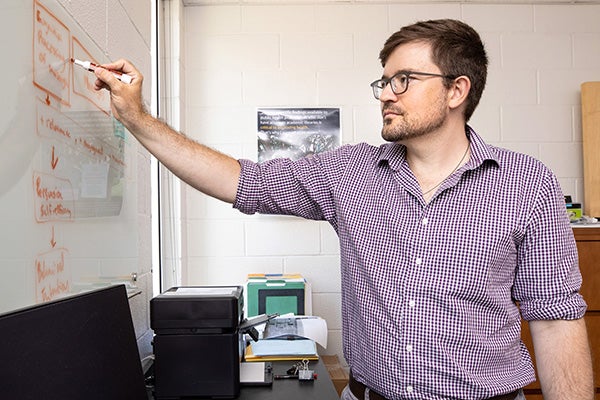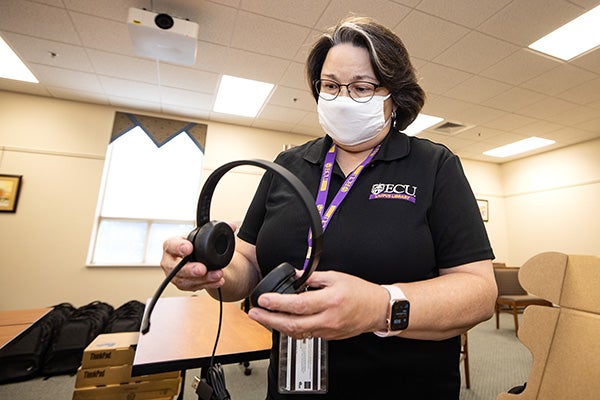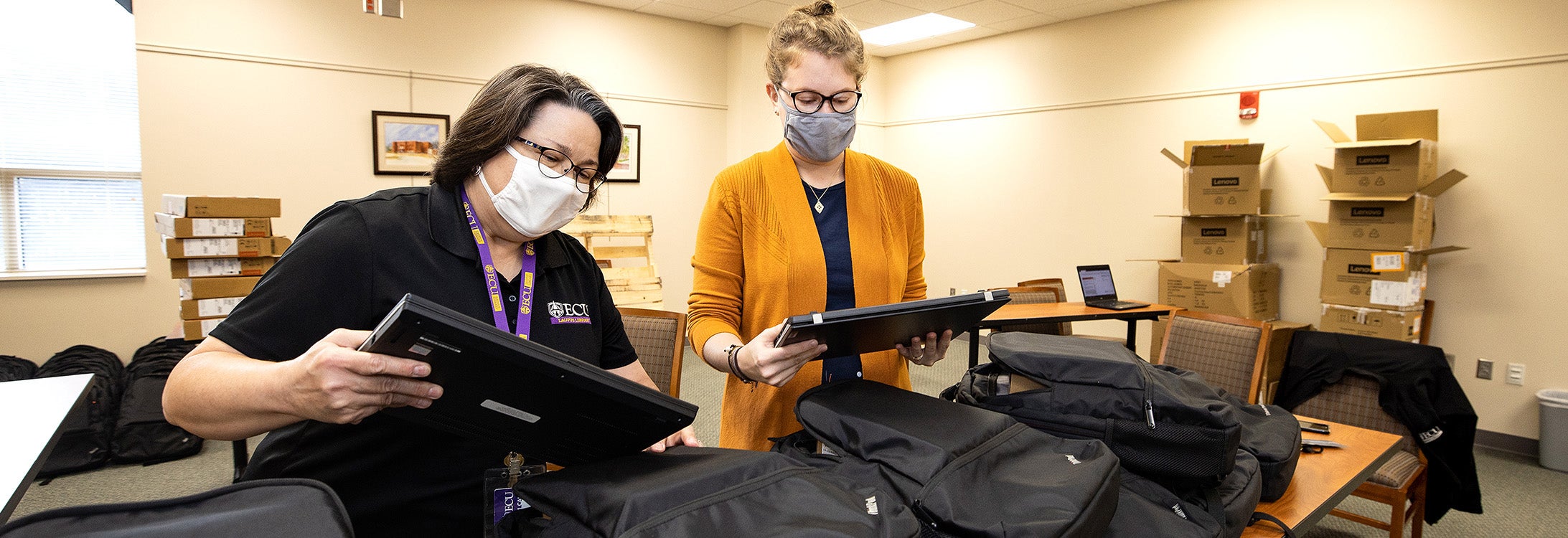CONNECTING THE COMMUNITY
Laupus Library, partners provide laptops to school-aged children of migrant farmworkers
Laupus Library has been awarded a $75,000 grant through the Institute of Museum and Library Services to provide laptops and health education instruction to the school-aged children of migrant farmworker families in eastern North Carolina.
The library purchased 100 laptops to be distributed in November 2020 to middle- and high-school children in Wayne and Pitt counties. Beth Ketterman, Laupus Library director, said laptops were chosen as the device to best meet the needs of these students.
“The shift to remote instruction upended education in the greatest of ways,” said Ketterman. “Providing a device that is not just loaned, but given to a student who has the added challenge of potentially moving during the pandemic, means they can have a consistency in access to their learning materials.”

Dr. Joseph Lee, from the Department of Health Education and Promotion in the College of Health and Human Performance coordinated a grant in 2019 that provided hotspot internet connectivity for these same migrant communities.
The project dovetails a previous grant coordinated by Dr. Joseph Lee, from the Department of Health Education and Promotion in the College of Health and Human Performance, which provided hotspot internet connectivity for these same migrant communities.
Ketterman said that after she saw the funding announcement she approached Lee about partnering on an application.
“We brainstormed around the idea of deploying devices that include quality health information and health literacy instruction since that was a need that hadn’t yet been met in his existing grants,” Ketterman said. “Then once we started talking with the partners and then the area schools, it became clear that this project had a lot of support.”
The grant was awarded under the provisions of the federal Library Services and Technology Act as administered by the State Library of North Carolina, a division of the Department of Natural and Cultural Resources (IMLS grant number LS-246155-OLS-20).
According to Lee, his work on the National Library of Medicine Health Disparities Resource Grant includes an advisory board and community partners.
“We were able to leverage those connections to quickly turn around an application to get resources for students from farmworker families in eastern North Carolina,” Lee said.
Lee brought on board other vital partners from the Student Action with Farmworkers and the North Carolina Department of Public Instruction’s Migrant Education Program (MEP) who worked to help place the laptops with students with the greatest needs and provide guidance for health information seeking instructional modules.
According to the grant application and completed pilot studies, migrant students who move across the agricultural season are among the most vulnerable in the education system. With schools transitioned to online learning, students without access to internet and technology are quickly falling behind. In the pilot study completed by the team and funded by the National Library of Medicine (NLM) to provide tablets and information literacy training to youth from seasonal farmworker families, it was found that half of the middle and high school participants had no internet access at home. Although the study was small, it determined that it was likely that internet access is only worse in more rural areas and with more migratory families.
Lee said the students receiving laptops are participants in North Carolina’s Migrant Education Program, which helps coordinate the education of students who move across the agricultural season.
Laupus Library staff developed the educational component of the laptop project to provide the Migrant Education Program staff and English as a second language teachers in Lenoir/Greene, Wayne and Pitt counties with instruction on how to find reputable health information online.
“Each laptop comes with a backpack, headphone/microphone headset and two USB drives, one loaded with the WiderNet ‘“Pocket Library,”’ a customized pocket library of health information sources,” said Laupus Library Associate Director Roger Russell, who was the co-PI on the project with Mary Roby, assistant director of user services.
“Even in the midst of a global pandemic, arguably the worst time to connect with anyone, we have connected with so many people working within our eastern North Carolina schools through programs like MEP and English as a Second Language (ESL) who are incredibly grateful for this project and what it offers,” Russell added.

Mary Roby inspects a headset before placing it in a computer bag at Laupus Library.
Jamie Bloss, librarian liaison to the College of Allied Health Sciences and the School of Dental Medicine said the eight-GB USB drives are loaded with videos on how to find information on the COVID-19 pandemic online and how to search for health information, handouts with educational resources and websites they can access such as ConectateCarolina, Khan Academy links, a link to a free database to search for articles and free open-access textbooks links.
“We wanted to make sure there was a good amount of education resources the students can access and also some resources on health information as well that can be accessed offline,” she said. “We also included links on how to use Google classroom, Open Office Writer, and other educational software they might be using during the pandemic with virtual learning. The videos can be accessed without use of the internet, and the handouts included links they can access via the internet.”
In addition to providing these resources directly to the students and their parents, Bloss said they will also host a four-hour continuing education class for MEP and ESL teachers.
“This class will focus on information literacy skills like searching for reliable health information online, and then they can also work with students and parents should they need assistance getting information on any health topics,” she said. “We will be hosting a two hour webinar for the teachers in the targeted counties, and they will also have some videos to watch and a searching exercise to complete on their own.”
Ketterman says she looks forward to assessing the project and finding ways the library can continue to build on outcomes with its partners.
“Laupus is a great connector of people with information, and the library also believes in the ECU mission of ‘Servire,’” said Ketterman. “This project exemplifies both by bringing together ECU partners with collaborators in rural NC to increase access to quality health and education materials for these school children.”
Lee said he’s proud to be a part of this partnership and of this effort to improve our region.
“When you combine the expertise of Laupus Library, the connections of community partners and expertise from our faculty, we can make a big difference in the health and well-being of our communities.”
